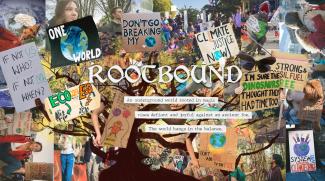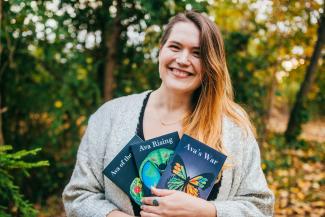
For decades, the fossil fuel industry has poured money into discrediting climate science and misleading the public.
According to Allard Law doctoral student and UBC Climate Hub founder Grace Nosek, those efforts have been overwhelmingly successful in preventing and delaying climate action. “We know that the technical and economic barriers to phasing out fossil fuels have already been crossed,” she explains. “The only barrier to change is political.”
Her solution? Creating new narratives that expose industry propaganda and show a way forward. That’s the goal of Grace’s forthcoming book, Rootbound — and its immersive, online fandom. “The goal is to create content that is engaging and enjoyable, but that also explains the power of frontline defenders, systems change and collective action,” says Grace.
The novel will be free and accessible to young people around the world, released serially on Wattpad throughout the fall. Grace has recently launched a GoFundMe to support her work to bring Rootbound into classrooms.
In this Q&A, Grace explains why it’s important for the climate justice movement to shape its own narratives and what the ‘Rootbound Universe’ is all about

You're currently working on your PhD at Allard Law. What's the connection between Rootbound and your research?
It’s become clear through my research that the fossil fuel industry has shaped the public imagination on climate change so profoundly and so invisibly over the last forty years that actors, including universities, don’t even realize they’re entrenching fossil fuel industry talking points and policy preferences as they take good faith efforts on climate change.
As I argue in my thesis, transformative climate change will be impossible without robust efforts to challenge these industry narratives. They can’t be countered by research alone.
This is why my novel is such a critical part of the praxis and scholarship of my doctoral work. It shows how the fossil fuel industry undermines democracy and how to energize the public for climate action.
How did you come up with the title?
The magic system in Rootbound is inspired by UBC professor Suzanne Simard’s research on the complex lives of trees. As Simard explains, ‘mother trees’ connect with trees of different ages, and can facilitate the growth of the understory seedlings.
I’m a youth climate justice organizer, and I’ve always thought youth organizers behave like these mother trees — nourishing each other and their communities. In my novel/world, two people can become “rootbound” by taking a vow to share energy, love, grief and nourishment. This vow is witnessed by community and magically sealed by a tree, allowing the activists to tangibly share each other’s energy, love and skills. The whole book is an homage to the courage and moral clarity of youth climate strikers and frontline defenders, and a joyful invitation into the climate justice movement.
Part of your project involves creating the interactive ‘Rootbound Universe.’ Tell us about that.
Fandoms are these incredible spaces of community building, organizing, and wild creativity. And young people seek them out — they WANT to be in these creative, immersive communities built around story.
I thought it would be incredible to co-create that kind of fandom using my novel and research as a jumping-off point. As we build out the Rootbound online fandom, young people around the world can learn about the root causes of climate change, build empowering community, design their own piece of the world through their own joys and talents and take collective action.
You just launched a crowdfunding page. What are you planning to do with the funds you raise?
I’m hoping to jumpstart the second phase of the Rootbound project: hiring more youth artists to contribute and having the time and capacity to partner with non-profits, teachers and professors to bring Rootbound to the classroom.
We want to teach youth about fossil fuel industry misinformation and empower them to create their own pieces of the Rootbound world for academic credit — things like flash fiction, music, graphic novels, board games, trading cards, mood boards, aesthetics, online quizzes, poetry and more.
Young people are experiencing a mental health crisis, driven in part by anxiety around climate change. In a recent survey of 10,000 youth on climate and mental health, 75% said they think their future is frightening. I want to ensure they have access to resources that make them feel hopeful and empowered.


